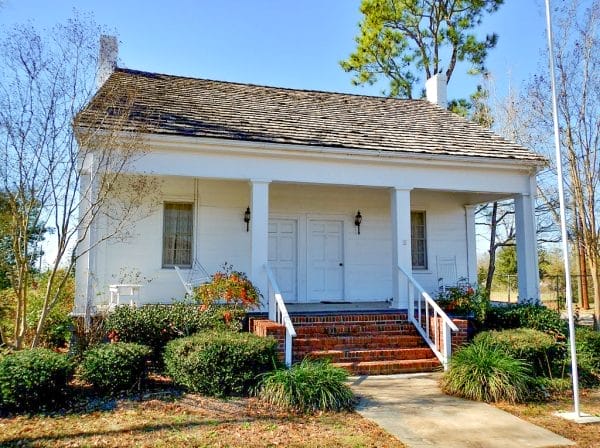Bethune-Kennedy House
The Bethune-Kennedy House is a historic home in Abbeville, Henry County. Currently owned by the Abbeville Chamber of Commerce, the house acts as a landmark and historical residence. One of the oldest buildings in Abbeville, it was added to the Alabama Register of Landmarks and Heritage in 1976 and the National Register of Historic Places in 1977.
 Bethune-Kennedy House
The house was built around 1870 by William Calvin Bethune on what was then Three Notch Road. Bethune was a prominent doctor who had been a lieutenant colonel in the Fifty-seventh Alabama Infantry Regiment during the American Civil War. The Bethune-Kennedy house is a Creole-cottage style, which is common on the Gulf Coast but extremely rare inland. It features a gabled roof supported by four square columns with Doric capitals and an exterior chimney on either end. There are two separate doors at the front of the house, each with six panels, and two nine-over-nine windows hang next to each door. The original wooden shingles have been covered with asphalt roofing tiles. The recessed gallery is made with shiplap, but the rest of the house has clapboard.
Bethune-Kennedy House
The house was built around 1870 by William Calvin Bethune on what was then Three Notch Road. Bethune was a prominent doctor who had been a lieutenant colonel in the Fifty-seventh Alabama Infantry Regiment during the American Civil War. The Bethune-Kennedy house is a Creole-cottage style, which is common on the Gulf Coast but extremely rare inland. It features a gabled roof supported by four square columns with Doric capitals and an exterior chimney on either end. There are two separate doors at the front of the house, each with six panels, and two nine-over-nine windows hang next to each door. The original wooden shingles have been covered with asphalt roofing tiles. The recessed gallery is made with shiplap, but the rest of the house has clapboard.
Like similar houses of this design, there is no central hall. Instead, all the rooms open into the large front room. Two original mantels are still in the home, and the more ornate one has fluted pillars, a frieze, and corner blocks with a shelf supported by moldings. The original back porch and the breezeway were removed in the early twentieth century to make room for additional bedrooms. Those additions were removed by the Henry County Board of Education when it owned the home and two schoolrooms were placed near the building.
Bethune and his wife, Mary Ellen Callaway, had five children, most of who were born after they lived in the house. The house changed owners at least three or four times until 1885, when owner Walter K. Stokes sold it to William and Mollie Kennedy in 1885. The Kennedys had farmland in Henry County but chose to live in their new house because they wanted to be close to the county seat and enjoy the benefits of living in the largest town in the area.
The Kennedy family owned the house until 1974, when the Henry County Board of Education acquired it. In 1976, the Kennedy House, as it was then called, became a contentious point of local interest. The Board of Education planned on demolishing the house unless it was bought quickly to make more room for the crowded Abbeville Middle School nearby. Few people in the community were concerned over the then-derelict building, though County Superintendent William Covington supported attempts to save the house. The Henry County Historical Society and its president, William Nordan, for whom the History Room at the Abbeville Memorial Library is named, also sought to save the historic house and launched efforts to draw attention to the historic significance of the home. His interest led him to Cheryle Webster, a transplant to Abbeville who had recently renovated another historic home on Kirkland Street with her husband. Webster and Nordan were successful in rallying local interest, and Webster was able to gather other women from local clubs into forming the Community Improvement Council. The Abbeville City Council then allocated $1,000 to the council to help save the home.
The Community Improvement Council bought the home for use as a community center in 1976. In 1978, Abbeville held its first Parade of Homes on May 28. Webster and her renovated house, the Johnson-Webster House, was part of the tour, along with the Abbeville Methodist Church built in 1896, the Clendenin-Hardwick House, which is supposedly haunted by a Confederate soldier, the 1903 Stokes-Rane House that was used as a law office, and the Henry County Bank, in a Greek Revival home dating from 1908. The profits from this tour were used to renovate the Bethune-Kennedy House. The house was part of the Historical Walking Tour in Abbeville for the Henry County Bicentennial in 2019.
The Bethune-Kennedy House is located 300 Kirkland Street. Owned by the Abbeville Chamber of Commerce, it may be toured by appointment by contacting the Abbeville Chamber of Commerce secretary. Nearby are the Abbeville Memorial Cemetery (ca. 1841), the Abbeville Methodist Church (ca. 1896), the Clendenin mansion (ca. 1882), and the home of Alabama governor William Calvin Oates.
Further Reading
- Rawls, Phillip. “Old Eyesore Now Source of Pride.” Montgomery Advertiser, November 21, 1975, p. 5.
- Wesley, Phyllis. “The Passing Throng: A house can be a home to Abbeville residents.” Montgomery Advertiser, May 25, 1978, p. 15.

